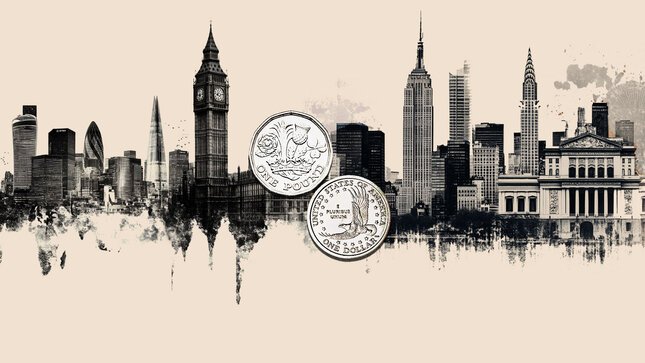Might the UK end up a surprise financial beneficiary of Trumpite chaos?
I ask this question not because there is still some hope of Britain winning a carve-out from the swingeing tariffs that America threatens to impose on Europe – though this does indeed remain a possibility – but because if international investors are losing faith in the mighty dollar, then they need somewhere else to go, and sterling may be a good alternative.
This might seem an odd thing to argue given the doom-laden narrative that has hung like a pall over the UK economy ever since Brexit. Nor is it even as if the outlook is beginning to brighten.
To the contrary, things are again on the slide, with the Office of Budget Responsibility expected to halve its growth forecast for this year to just 1pc in the Spring Statement on Wednesday.
The public finances too are once more on a deteriorating trajectory, forcing Rachel Reeves, the Chancellor, to find more than £10bn of additional spending cuts to stay within her fiscal rules.
If growth has stalled, inflation is meanwhile rising, a classic stagflationary environment that leaves the Bank of England at a loss to know which way to turn on interest rates.
Policymakers would cut rates if they were looking at growth prospects alone, but would raise them if focused instead on inflation, where many of the immediate pressures are strongly upwards.
There will no doubt be a furious argument when the new growth forecast is announced over whether it is international factors or the self-harm of UK government policy which is causing this miserable state of affairs.
Probably a bit of both. Labour’s cack-handed tax on jobs, set to come into force next month, has dealt a hammer-blow to business confidence, which has in turn been further damaged by the Government’s employment rights legislation.
But international factors, and in particular fears of further fragmentation in the world economy on the back of Trump’s tariff war, are also plainly weighing heavily on sentiment.
The OECD cut its growth forecasts for virtually all economies last week in its updated outlook, with the UK notably faring rather less badly than most. All the same, things still look worrying enough.
Why then would investors be flocking to the UK’s door?
All things are relative, and in a lineup of the ugly, it is the least ugly that wins the prize.
The point is that both politically and economically, Britain looks more stable than most. Sir Keir Starmer, moreover, talks a good game on deregulation and reform, even if his party would not seem temperamentally well-suited to practical implementation of the laudable objectives he has taken to trumpeting.
Last week’s package of welfare reforms were a country-mile short of the radicalism required to get Britain working again.
None the less, much of the messaging is encouraging. In a seeming mark of approval, Britain’s usually unloved FTSE 100 is up 7pc since Donald Trump was elected US president in early November, whereas the S&P500 is down nearly 5pc. And since the turn of the year, the pound has been climbing steadily against the dollar.
These movements cannot yet be read as a decisive change in the weather. If they mean anything at all, it’s much more about aversion to Trumponomics than a vote of confidence in the UK.
As it is, the UK’s position remains exceptionally challenging, with public debt close to 100pc of GDP, and a stubbornly persistent budget deficit that will again require near-record levels of gilt-edged issuance over the year ahead.
But think about it: where else do you put your money if the White House is about to dispense with the US’s traditional strong dollar policy? The UK gilts market is not such a bad bet, and is therefore well-placed to benefit from dollar flight.
Though nowhere near as big as the US Treasury market, gilts are both highly liquid and are backed by rock-solid rule of law. If you had to bet on it, you’d also say that the Bank of England’s price stability mandate is rather more secure than that of the US Federal Reserve, whose independence is challenged on an almost daily basis by the Trump presidency.
What’s more, precarious though the UK’s position might seem, there is virtually no chance of default. In this regard, Britain’s record as a major borrower is almost uniquely unblemished.
Rather unfairly I always thought, the UK is excluded from the list of six nations that have never defaulted in “This Time is Different”, Carmen Reinhart and Kenneth Rogoff’s otherwise majestical book on eight centuries of financial folly.
These countries are listed as New Zealand, Australia, Thailand, Denmark, Canada and the US. What the US is doing there is a bit of a mystery, since it is possible to point to at least four technical US defaults, not least when Richard Nixon collapsed the Bretton Woods monetary system by reneging on the US’s commitment to redeem dollars for gold.
In any case, the UK should surely be among the sainted, for on the two occasions cited as default, the case is at least arguable.
One was to change the coupon on war loan, a possibility that was in fact specifically allowed by the prospectus, and the other was an “excusable default” on back-to-back “inter-allied” war debt to the US.
In this case, the original defaulter was Germany, whose refusal to pay continued reparations left the UK with no money to honour its debts to the US.
Once upon a time, the primary reserve currency for much of the world was the pound sterling. That position was usurped by the United States after the UK lost the empire and, in effect, bankrupted itself in the First and Second World Wars.
It might have been better for the UK economy had it wiped the slate clean along with everyone else, but it is an article of faith at HM Treasury that – excepting the backdoor default of inflation – the UK always honours its debts, whatever the costs.
This attitude has been key to establishing the City as Europe’s primary financial centre, and it now stands the UK in good stead as a haven from the policy uncertainty that is sweeping the US.
Largely unrecognised, sterling is still the fourth-largest reserve currency in the world after the dollar, the euro and the yen, with nearly 5pc of official foreign exchange reserves.
I doubt the dollar will ever be entirely knocked off its pedestal, or not in my lifetime in any event, but at the margins the UK could benefit greatly from American self-harm.
What’s for sure is that with the national debt once more swollen to war-like levels, the UK gilts market needs all the support it can get.







